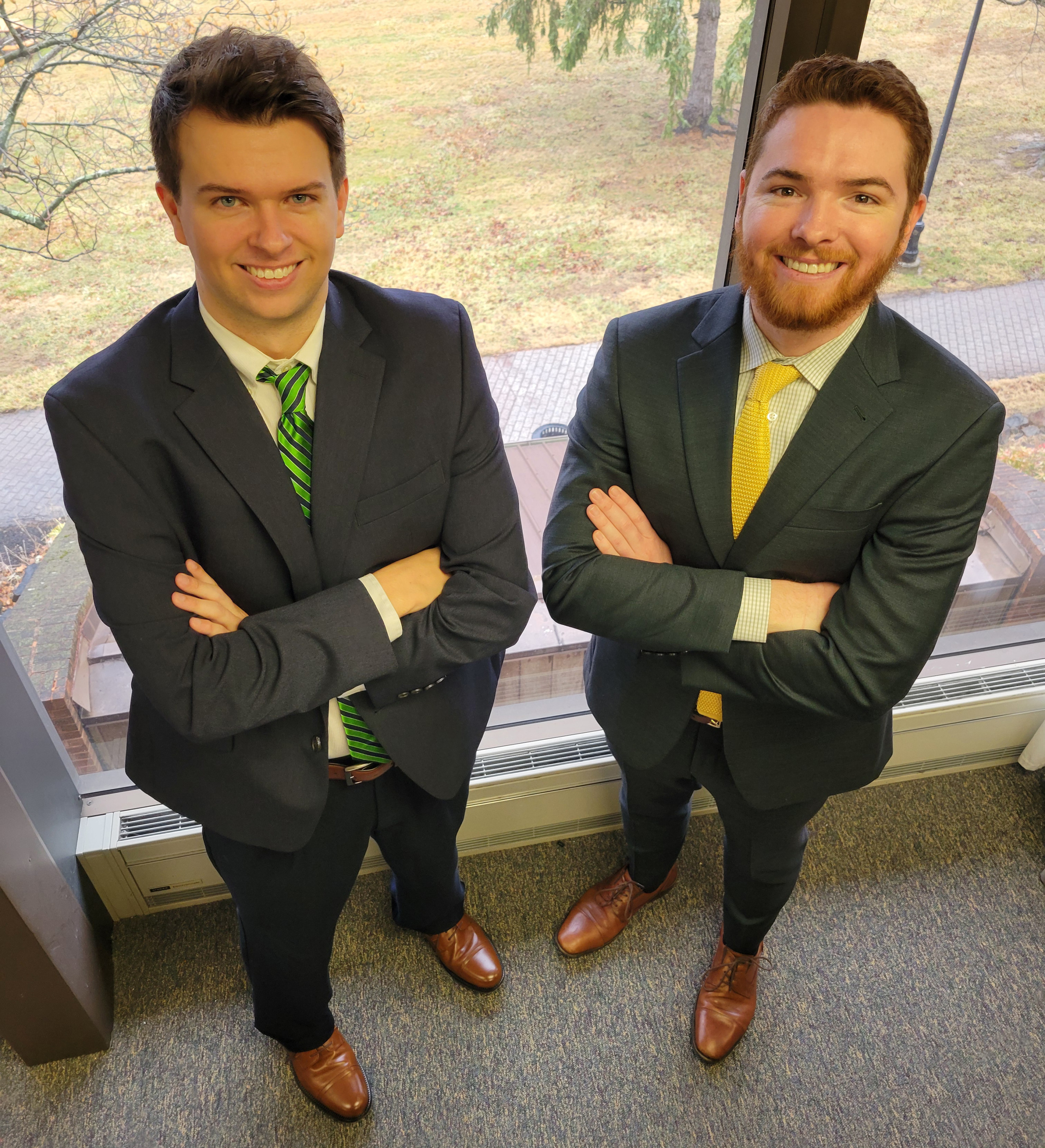Delaware Law Students and Faculty Play Role in Unprecedented Environmental Law Case
2/6/2025

Delaware Law students Austin Anderson (left) and Jack Garvey (right).
When Widener University Delaware Law School students Jack Garvey and Austin Anderson registered for a climate rights seminar in spring 2024 they had no idea they would be part of a groundbreaking environmental law case decided by the Supreme Court of Montana that has drawn national and international attention.
“I came into law school thinking I’ll go to class, study hard and graduate, but here we are,” said Garvey, who will earn his juris doctor this May and plans to sit for the Pennsylvania bar exam. “We both went out on a limb to do something very cool but very difficult. And it paid off in a good way. That was really reaffirming. If you put your head and heart into an issue you can do anything.”
The seminar taught by Distinguished Emeritus Professor James R. May presented Garvey and Anderson a tremendous hands-on learning opportunity when the nonprofit Our Children’s Trust asked May to write a friend-of-the-court brief to the Supreme Court of Montana. The trust had sued the state, arguing the state constitution provided Montanans a right to a life-sustaining climate. Through appeals, the case had wound its way to that state’s highest court. May agreed to help, then turned it into opportunity for his class.
“I invited interest from seminar students to assist in a new area of law in Montana – a judicial system foreign to them – with no model and little legal guidance, over February and March, which included their spring break. Jack and Austin – second-year law students at the time – stepped up to the challenge and contributed top-quality legal work,” May said.
Both Garvey, who grew up in New Jersey and attended the University of Scranton before law school, and Austin, a Michigan State University graduate who moved to the First State to attend Delaware Law, said they liked the prospect of working on a real case.
“Our other writing options for the seminar were fictional, but this had real-world lasting impacts,” Anderson said.
There were countless hours of research, battles with imposter syndrome, a computer problem close to deadline, trying to spend spring break with loved ones in Tennessee and Philadelphia – but actually spending most of it holed up alone or in the library, writing.
“It was a pretty daunting task. We were doing it ourselves and we had to figure it out,” Anderson said.
“And when Austin’s computer crashed, that was like a horror movie,” Garvey added.
May said the duo worked independently, consulting with him and other seminar students as sounding boards in class and even outside of it. As the supervising and licensed attorney, May edited the brief and filed it with the court.
The students started the work by meeting with representatives from Our Children’s Trust, and from there came the research, leg work and drafting, including citing a leading article co-authored by May and fellow Professor Emeritus Erin Daly, on constitutionalizing climate.
May said it was not a simple task. Anderson focused on the environmental rights aspect of the brief, while Garvey concentrated on arguments involving dignity rights.
In the end, the brief was filed on behalf of 40 professors from law schools around the country including Duke, Georgetown, and Yale. May coordinated the signatures. Three Delaware Law professors lent their names in addition to May. The case was argued in the summer, and recently the Montana Supreme Court ruled 6-1 that the state’s climate policies violate Montana’s state constitutional rights to a healthful environment and human dignity.
The court sided with positions argued in the brief, and May, Garvey and Anderson’s names are all noted on page three of the opinion. The outcome of the case has drawn national and international attention and was a leading Google search in the hours after it was decided. The court ruled that Montanans have a right to a stable climate and that Montana must stop violating the law.
“This kind of thing hardly happens every day, much less in a career,” May said.
Both students said they were shocked by the outcome. Anderson needed a few days “to come back to earth.”
“It was a cloud nine kind of thing,” he said. “I remember telling everyone this doesn’t feel real.”
For both of them, the experience solidified law as the right career path. Garvey said he would love to eventually work in environmental law. He is clerking for a judge next year and afterwards would like to do trial work for a county or state agency, or an agency that advocates for environmental protection.
Anderson’s interests are in civil rights and environmental law. He is still determining where he’ll sit for the bar exam after graduation – either in Virginia or he’ll possibly take the uniform bar exam, a standardized exam that is administered across multiple jurisdictions.
Both students are proud of their roles in a case whose outcome was the first of its kind in the United States.
“We assisted in making actual change, not just for us, but for future generations and potentially millions of people,” Anderson said. “It reminds me that as long as I stick to it, and believe in myself, the world is my oyster.”
Garvey said he hopes people will read the court opinion and learn about the issues.
“We’re all living here and we only get one earth,” he said. “It’s immensely important.”
